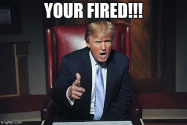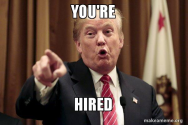That's me on the teams calls with the Indians contractors
You are using an out of date browser. It may not display this or other websites correctly.
You should upgrade or use an alternative browser.
You should upgrade or use an alternative browser.
Trump 2.0 official thread
- Thread starter siegecrossbow
- Start date
Be careful! 2030 is just five years away…
That's me on the teams calls with the Indians contractors
https://www.reddit.com/r/4chan/comments/j03cjs
When will Trump eliminate the postal service and fire all the postal workers?
When will Trump eliminate the postal service and fire all the postal workers?
The Danger of Trump’s Plan for a Private USPS
“To me, DOGE is a question of billionaire oligarchs trying to figure out how to get more money into their private profits.”
At a December 2024 press conference in Mar-a-Lago, Donald Trump his administration would be looking into privatizing the United States Postal Service, renewing from his first presidential term to limit government programs and services. The Washington Post that same month that Trump stated the government should not subsidize the agency due to its .
“The days of bailouts and handouts are over,” House Oversight Committee Chair James Comer (R-KY) during a December 2024 hearing with Postmaster General Louis DeJoy. “The American people spoke loud and clear…there’s going to be significant reform over the next four years.”
There’s been constant efforts to piecemeal privatization of the Postal Service, and some of that has taken hold. There was [starting in 2013], and a couple decades before, there was a similar effort for ’ department stores to do the retail. If the postal service gets turned over to the private sector, then prices are going to go up and service is going to go down. And what happens if that private company no longer can or wants to do it and people lose their services?
The White House in 2018 for the breaking up and the selling off of the public postal service. So that’s a whole different level [of privatization].
Let's see if any USPS workers goes postal after getting laid off
Speaking of USPS, they are a big reason why the de minimis ban was unworkable.
A particular challenge is the government-owned United States Postal Service (USPS). Although USPS only accounted for about 5% of last year's total de minimis shipments, some 75 million parcels, experts described it as the Achilles heel of any policy to remove tariff exemptions on low-value shipments. USPS, with a history developed around the receiving and sending of letters, is not set up to assess and process duties on packages of sweaters, shoes and headphones coming from abroad.
Express carriers like FedEx, UPS and DHL have in-house customs brokerage divisions that collect any tariffs owed by package recipients, and these companies often handle every step of a delivery, from drop-off to doorstep. In contrast, USPS receives items from foreign postal services that are flown into a handful of international mail facilities at major U.S. airports. These packages often arrive with limited information about their contents. In addition, USPS is not set up to process tariffs.
"The postal service has absolutely no way, themselves, to collect duty or pay duty to the government," said Cindy Allen, CEO of Trade Force Multiplier, an international trade consultancy service, and a former CBP official.
Trump Admin fires 325 staff that oversees the US nuclear weapons stockpile.
And then promptly rehires them back.
One source revealed that approximately 325 employees have been dismissed from the National Nuclear Security Administration (NNSA), which oversees the U.S. nuclear weapons fleet
And then promptly rehires them back.
Managers with the National Nuclear Security Administration (NNSA) are frantically calling employees back and telling them that -- as of right now -- they're not fired, despite some receiving termination emails and phone calls on Thursday. Their badges are getting turned back on and access to federal systems is being restored, at least temporarily.
Which one is Trump?The idea of servant leadership isn’t really new. In the fifth century BC, the Taoist philosopher Lao-Tzu defined four types of leaders:
- The almost invisible
- The loved and admired
- The feared
- The despised
This scandal might become big. Insane chaos.Trump Admin fires 325 staff that oversees the US nuclear weapons stockpile.
And then promptly rehires them back.


